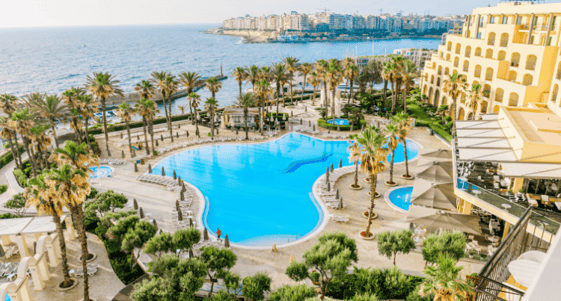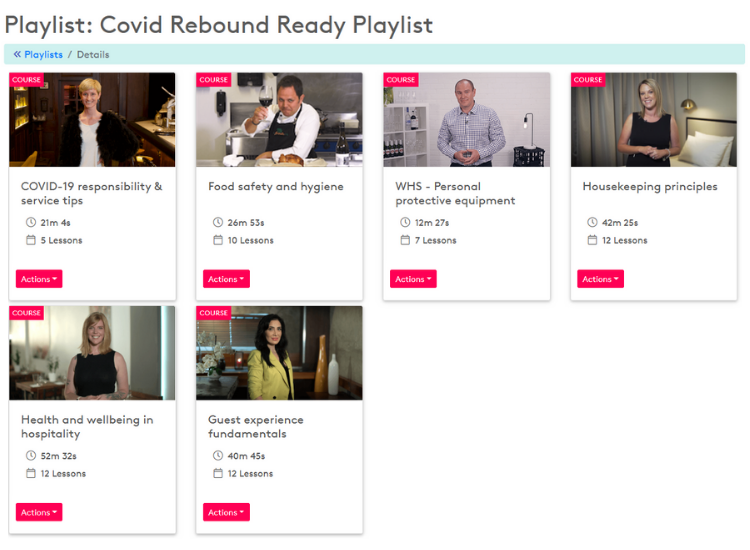Why you should think about AI for your restaurant
Maybe AI seems futuristic - but the future is here! Ankit Patel talks us through the easiest and most effective ways AI can improve your restaurant.
It's tricky figuring out the best way to reopen after COVID-19. Here's some inspo from hotels around the world doing it right.
Under coronavirus, everything about the function, service, message and meaning of hotels has changed. If restrictions have been lifted in your area and you’re looking at reopening your hotel, or resuming normal operations, there’s a lot to consider.
Luckily, there are a few hotels leading by example in this arena. In today’s blog post, we’re looking at some of the best reopening strategies and approaches from hotels around the world.

Hold your breath and knock on wood – the worst of the pandemic seems to be passing. Coronavirus has been nothing short of disastrous for the industry: hotels have experienced an abrupt change in occupancy rates, staffing requirements, and operational standards. Destination hotels and resorts; regional hotels; airport hotels; business hotels – all have been hit hard by the worldwide decrease in travel for both leisure and business. But the tide is starting to turn.
So where do we go from here?
Right now, the hotel industry is working through a bit of an existential crisis: who are we, what does our offering look like, what stories are we trying to tell? There’s a fine line to walk between providing something familiar, credible, and reliable – something that resembles the guest experience of 2019 – and a service that understands the world has changed, and can offer safety, security, and professionalism.
The most successful hotels in this period will be those who understand that their role, identity, and social perception has fundamentally changed. This is not just a matter of logistics and operations, but of marketing: taking control of the narrative, and making it work to your best interest.
The key here is leaning into the change. Resisting it, or trying to pretend that things are 100% back to normal, will (best case) result in raised eyebrows from guests, or (worst case) negative PR.
Remember that this is still a transitional period, not the aftermath – things may be getting better, but they are still in flux. Avoid treating the lifted restrictions as a green light to settle back down and get stuck in messaging or policies that may not work for you in three months time.
Hotels are successfully managing this period with a variety of great, innovative ideas – including:
Using one (or ideally a combination) of these strategies is an incredibly effective way to encourage guest confidence and make sure your staff are in fighting shape to get the business back on track. Some specific hotels who are taking this extra-mile approach and putting it to great use to develop their own policies include:
Taking an even closer look at how hotels are handling their reopening guidelines, here are four case studies in putting these approaches to great use:
Pan Pacific’s approach is effective because it’s incredibly straightforward, and easily accessible – it’s written in plain English, and it’s very easy to find by web search. On its website, it clearly references guidelines set out by the US Center for Disease Control and Prevention, allowing it to ‘borrow’ from the CDC’s position of authority and credibility.
It has also listed specific measures and goals on-page, for easy peace of mind. These include, among other things:
Not sure whether it's safe or wise to reopen yet? The CDC has produced a useful and detailed guide for how to decide on your venue's reopening.
No need to go searching: there's a PDF waiting for you right here.
Hyatt's response to the crisis is particularly noteworthy because of their emphasis on flexibility, particularly when it comes to their change and cancellation policy. This is an excellent example of leaning in to change – rather than simply setting mandates and new policies, they’ve positioned themselves as working with guests as we move through the pandemic together.
This is incredibly effective messaging: it has the same flavor as the 'we're in this together' taglines we've all seen a thousand times, without any overt saccharine. Infusing customer policies with this kind of flexibility allows you to provide excellent customer service, which obviously attracts positive guest feedback and a higher chance of return visits.
Hyatt has also created its own accreditation program for cleanliness and training, in partnership with the Global Bio-risk Advisory Council. The Global Care and Cleanliness Commitment staff program certifies successful participants as ‘sanitization specialists’, who will thereafter be qualified for the newly-created role of ‘Hygiene Manager’. This is a person responsible for training and maintaining strict hygiene standards and any new operational procedures developed as a response to coronavirus.
Online learning programs are a great way to reach out to your staff and make sure everyone’s confident and comfortable with new policies. At Typsy, we’ve gone a step further and curated a playlist of courses that deal with directly with issues you and your staff may be facing as a result of coronavirus.

This playlist is designed for you to draw on and create your own reopening policies. Accessing this content for yourself and your team ensures consistency across your entire business, giving you the flexibility you need to adapt to whatever pops up next in the coming months and years.
It’s also essential to remember to tailor your response to your local and regional needs, and stay on top of that in your messaging – particularly while air travel is still heavily restricted in many countries around the world. Demonstrating a good understanding of what local visitors will be looking for in a hotel stay – rather than necessarily gearing towards international travelers – is a great way to ensure you stay relevant, even if your clientele are typically destination holiday-makers.
In Thailand, Cape and Kantary Hotels are addressing safety concerns by frequently and routinely testing drinking and pool water samples for safety, along with the hygiene measures that other hotels have in place. Similarly, guests are temperature-scanned on arrival; and their policy specifies a 75% alcohol solution for sanitization.
The specificity of these measures creates a guest-focused approach, which again effectively communicates both authority and safety. This is emphasized on the hotel’s website, where the link to their COVID policies is prefaced with the phrase ‘You are our top priority’.
Looking for more ideas on how to impress your guests and emphasize service? Check out How to make a great first impression on guests.
Our final example is a great blueprint for how you can incorporate all these strategies into a single, comprehensive approach. Omni’s Safe and Clean initiative is a program and series of policies that reflect the hotel’s commitment to coronavirus safety, clearly lays out hygiene and safety procedures, addresses potential issues and concerns that are specific to its location and amenities, and offers creative and interesting solutions to those issues.
Safe and Clean, as with Pan Pacific’s approach, draws directly on CDC guidelines and states as much on its website. Among its many listed policy changes and safety measures, Omni has committed to:
Safe and Clean is effective from a marketing standpoint because of its incredible comprehensiveness. It communicates a great deal of consideration and thoughtfulness around how COVID-19 will affect not only hotel operations but guest experience - and lays that thought process out in a clear way that leaves very little to second-guess.
The road from here will undoubtedly have its ups and downs; the world is still changing and adapting, and hospitality is still finding its feet in the new normal. Hotels that can devise and implement these types of thoughtful, strategic approaches that convey flexibility and care will be sure to find themselves in the best position they can once the dust does, finally, settle.
How is your hotel adapting to coronavirus? Leave us a comment to tell us about a policy you're proud of!
Have a question? We’re always ready to talk.
Maybe AI seems futuristic - but the future is here! Ankit Patel talks us through the easiest and most effective ways AI can improve your restaurant.
If you're reopening after coronavirus, there may be some bumps along the way. Online supplier training can help smooth out the road. Typsy explains...
Getting ready to reopen your hospitality venue? Typsy's got the lowdown on everything you need to know about your obligations after COVID-19.
Be the first to know about new B2B SaaS Marketing insights to build or refine your marketing function with the tools and knowledge of today’s industry.